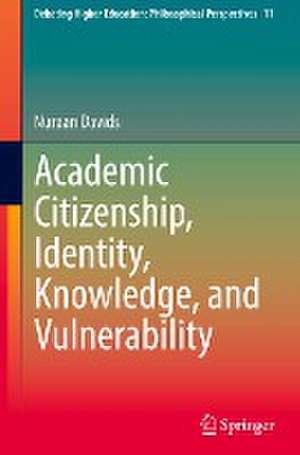Academic Citizenship, Identity, Knowledge, and Vulnerability: Debating Higher Education: Philosophical Perspectives, cartea 11
Autor Nuraan Davidsen Limba Engleză Hardback – 10 oct 2023
The book is influenced by a postcolonial vantage point, interested in unblocking and opening spaces, thoughts, and voices not only of reimagined embodiments and expressions of academic citizenship but of hitherto silenced and discounted forms of knowledge and being. It draws on academics' stories at various universities located in South Africa, USA, UK, Hong Kong, and the Philippines. It steps into the unexplored constructions of how knowledge is used in the deployment of valuing some forms of academic citizenship, while devaluing others. The book argues that different kinds of knowledge are necessary for both the building and questioning of theory: the more expansive our immersion into knowledge, the greater the capacities and opportunities for unlearning and relearning.
Preț: 781.94 lei
Preț vechi: 953.58 lei
-18% Nou
Puncte Express: 1173
Preț estimativ în valută:
149.67€ • 162.63$ • 125.81£
149.67€ • 162.63$ • 125.81£
Carte tipărită la comandă
Livrare economică 21 aprilie-05 mai
Preluare comenzi: 021 569.72.76
Specificații
ISBN-13: 9789819969005
ISBN-10: 981996900X
Pagini: 177
Ilustrații: VII, 177 p. 1 illus.
Dimensiuni: 155 x 235 mm
Greutate: 0.44 kg
Ediția:1st ed. 2023
Editura: Springer Nature Singapore
Colecția Springer
Seria Debating Higher Education: Philosophical Perspectives
Locul publicării:Singapore, Singapore
ISBN-10: 981996900X
Pagini: 177
Ilustrații: VII, 177 p. 1 illus.
Dimensiuni: 155 x 235 mm
Greutate: 0.44 kg
Ediția:1st ed. 2023
Editura: Springer Nature Singapore
Colecția Springer
Seria Debating Higher Education: Philosophical Perspectives
Locul publicării:Singapore, Singapore
Cuprins
Introduction: Academic conundrums.- Academic identities and citizenship.- Academic citizenship as an agonistic space.- Identities, citizenships, and vulnerabilities.- Diversity as vulnerability.- Academics as embodiments of knowledge.- Academic citizenship as curiosity.- The vulnerability of unlearning.- Identity and transformation.- Stories as reclamations of knowledge.- Responsibility and being other-wise.- Concluding reflections: Academic citizenship, collegiality, and trust.
Notă biografică
Nuraan Davids is Professor of Philosophy of Education and the Chair of the Department of Education Policy Studies in the Faculty of Education at Stellenbosch University. Her research interests include philosophy of education; democratic citizenship education; and Islamic philosophy of education. She was a fellow of the Center for Advanced Study in the Behavioral Sciences at Stanford University (2020 -2021). She is a Co-Editor of the Routledge series, World Issues in the Philosophy and Theory of Higher Education; Co-Editor-in-Chief of the Journal of Education in Muslim Societies; Associate Editor of the South African Journal of Higher Education, and an Editorial Board Member of Ethics and Education, and the Philosophy and Theory of Higher Education journal. Her most recent books include Out of place: An autoethnography of postcolonial citizenship (African Minds, 2022); Democratic education as inclusion (Rowman & Littlefield – Lexington Series, 2022, with Y. Waghid); and Academic Activism in higher education: A living philosophy for social justice (Springer, 2021, with Y. Waghid).
Textul de pe ultima copertă
This book brings into contestation the idea of academic citizenship as a homogenous and inclusive space. It delves into who academics are and how they come to embody their academic citizenship, if at all. Even when academics hold similar professional standings, their citizenship and implied notions of participation, inclusion, recognition, and belonging are largely pre-determined by their personal identity markers, rather than what they do professionally. As such, it is hard to ignore not only the contested and vulnerable terrain of academic citizenship, but the necessity of unpacking the agonistic space of the university which both sustains and benefits from these contestations and vulnerabilities.
The book is influenced by a postcolonial vantage point, interested in unblocking and opening spaces, thoughts, and voices not only of reimagined embodiments and expressions of academic citizenship but of hitherto silenced and discounted forms of knowledge and being. It draws on academics' stories at various universities located in South Africa, USA, UK, Hong Kong, and the Philippines. It steps into the unexplored constructions of how knowledge is used in the deployment of valuing some forms of academic citizenship, while devaluing others. The book argues that different kinds of knowledge are necessary for both the building and questioning of theory: the more expansive our immersion into knowledge, the greater the capacities and opportunities for unlearning and relearning.
Caracteristici
Interrogates the intersections between identity, knowledge, citizenship, and vulnerability Deconstructs ethnocentric assumptions in western knowledge and academic citizenship Draws upon the ethnographic stories of academics, located at institutions in a variety of geopolitical contexts












